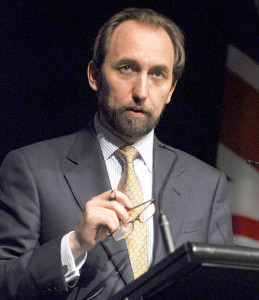A Brief Colonial History Of Ceylon(SriLanka)
Sri Lanka: One Island Two Nations
A Brief Colonial History Of Ceylon(SriLanka)
Sri Lanka: One Island Two Nations
(Full Story)
Search This Blog
Back to 500BC.
==========================
Thiranjala Weerasinghe sj.- One Island Two Nations
?????????????????????????????????????????????????Thursday, June 30, 2016
UN Human Rights Chief Wants Sri Lanka To Investigate Cluster Bombs Used In War, Underscores Need For International Judges

June 29, 2016
The United Nations High Commissioner for Human Rights, Zeid Ra’ad Al Hussein has called on the Sri Lankan government investigate the use of cluster munitions by the military during the final stages of the war against the LTTE, which also resulted in civilian deaths.
“In light of recent reports on new evidence that has emerged on the use
of cluster munitions towards the end of the conflict, following similar
allegations in the OHCHR investigation report, the High Commissioner
calls for an independent and impartial investigation to be carried out,”Zeid said in his annual report, which was submitted at the 32nd session of the Human Rights Council on June 28, 2016.
While emphasizing upon the need for the Sri Lankan Government to quickly
build public and international confidence in its determination to
pursue accountability, and to meet its obligations under international
human rights law, Zeid also underscored the need to bring in
international judges, prosecutors, investigators and lawyers into the
judicial mechanism to probe war crimes.
“The High Commissioner remains convinced that international
participation in the accountability mechanisms would be a necessary
guarantee for the independence and impartiality of the process in the
eyes of victims, as Sri Lanka’s judicial institutions currently lack the
credibility needed to gain their trust,” he said in the report.
Zeid also expressed his discontent over the slow progress made in
several crucial murder investigations, even thought they were initially
fast tracked during the first few months the Government was in office.
“During its first months in office, there were a number of high profile
breakthroughs and arrests made in a number of prominent cases, for
instance the disappearance of journalist Prageeth Eknaligoda, the
killings of newspaper editor Lasantha Wickrematunge and Tamil MPs Joseph
Pararajasingham and Nadarajah Raviraj, and the murder of rugby player
Wasim Thajudeen, but progress has since slowed, he said.
Zeid said that the early momentum established in investigating
emblematic cases must be sustained, as early successful prosecutions
would mark a turning point from the impunity of the past. “Continuing
allegations of arbitrary arrest, torture and sexual violence, as well as
more general military surveillance and harassment, must be swiftly
addressed, and the structures and institutional culture that promoted
those practices be dismantled, to show there will be no tolerance for
practices of the past,” he said in his report.


